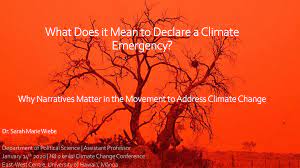 “N” = Narratives as Spoken or Written Accounts of Connected Events, Now the Climate Change Emergency
“N” = Narratives as Spoken or Written Accounts of Connected Events, Now the Climate Change Emergency
Article by Elizabeth Kolbert, New Yorker Magazine, November 28, 2022
Narratives are socially constructed ‘stories’ that make sense of events,” thereby lending “direction to human action.” So observes a paper published recently in the journal Climatic Change by a team of European researchers.
Climate-change narratives, the team notes, typically foreground “doom and gloom.” Often they emphasize risk. If they’re not retailing the latest warming-related disasters (fires, floods, food shortages), they’re predicting a future !lled with even grimmer warming-related disasters (bigger fires, more severe “flooding, famines that threaten entire regions).
This approach, the researchers argue, can be counterproductive: “Narratives of fear can become self-fulfilling prophecies.” If people believe that things will only get worse, they feel overwhelmed. If they feel overwhelmed, they’re apt to throw up their hands, thus guaranteeing that things will only get worse. A diet of bad news leads to paralysis, which yields yet more bad news.
What’s needed instead, the paper goes on, are narratives that “empower people to act.” Such narratives tell a “positive and engaging story.” They “articulate a vision of ‘where we want to go’ ” and outline steps that could be taken to arrive at this metaphorical destination.
Positive stories can also become self-fulfilling. People who believe in a brighter future are more likely to put in the effort required to achieve it. When they put in that effort, they make discoveries that hasten progress. Along the way, they build communities that make positive change possible.
Particularly compelling, by the researchers’ account, are “win-win” speech pressing for a “global green new deal,” Achim Steiner, then the administrator of the U.N.’s Environment Programme, described the “enormous economic, social, and environmental benefits likely to arise from combatting climate change.”
One of the key proponents of the Green New Deal in the U.S., Representative Alexandria Ocasio-Cortez, of New York, has argued that a crucial step toward building a more just, more environmentally sustainable future is imagining what this future would look like. “We can be whatever we have the courage to see,” she has said.
“Optimism is a choice,” notes Christiana Figueres, the Costa Rican diplomat who led the effort to get the Paris climate accord approved. “Do you know of any challenge that mankind has had in the history of humankind that was actually successful in its achievement that started out with pessimism, that started out with defeatism?” Figueres asked at a conference a few years ago. “There isn’t one,” she said, answering her own question.
#######+++++++#######+++++++#######
See Also: What Does it Mean to Declare a Climate Emergency?
Why Narratives Matter in the Movement to Address Climate Change
Dr. Sarah Marie Wiebe, Department of Political Science | Assistant Professor January 14th 2020 | Hā o ke kai Climate Change Conference East-West Centre, University of Hawaiʻi, Mānoa
